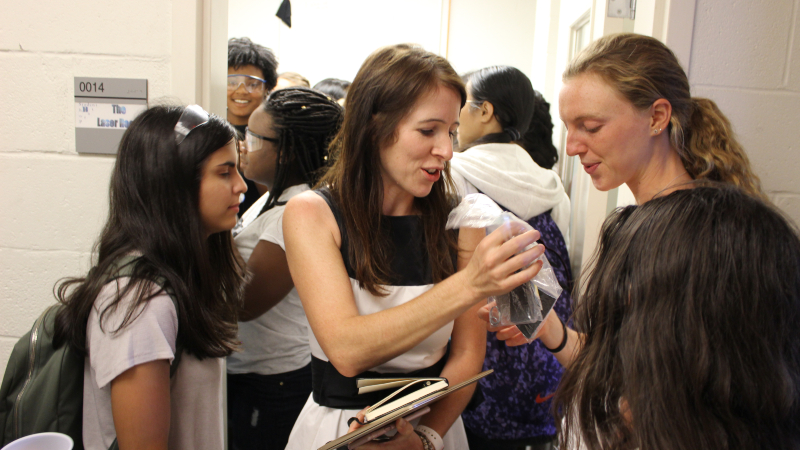Impactful Teaching Outside—Just As Much As Inside—the Classroom
Mark Schreiner
Rebecca Simmons is the winner of this year’s Duke MEMS Pratt Teaching Performance Award

Rebecca Simmons’s mechanical engineering students at Duke always get her best—from intensive and fun classroom sessions to deeply engaging hands-on design projects. But outside the classroom, they get even more.
“It is just a privilege to be able to foster learning, to help students achieve what they want to achieve,” said Simmons, an associate professor of the practice in Duke’s Thomas Lord Department of Mechanical Engineering & Materials Science.
 Simmons is the department’s 2023 recipient of the Pratt Teaching Performance Award. This new award was created to recognize, encourage and reward exceptional distinction, innovation and productivity in teaching. Four are awarded each year, with recipients receiving a one-time $15,000 salary bonus.
Simmons is the department’s 2023 recipient of the Pratt Teaching Performance Award. This new award was created to recognize, encourage and reward exceptional distinction, innovation and productivity in teaching. Four are awarded each year, with recipients receiving a one-time $15,000 salary bonus.
The team-learning and design-focused courses Simmons has created allow students to try on the identity of an engineer in a supportive environment where failure is an opportunity to learn.
Consider course ME 490: Product Design, taken by mechanical engineering and electrical engineering juniors and seniors. Her teaching partner is Tyler Bletsch, an electrical engineering professor and recipient of his department’s 2023 Pratt Teaching Performance Award.
Over the course of a semester, student teams design unique smart technologies. Projects have included a “smart spotter”—an automatic device to keep weightlifters safe during their reps—and a smart bicycle gear shifter.
“Students work through barriers and challenges to get through to the final project,” Simmons said. “Importantly, they begin to see that in design, there is no single right answer.”
At the end of the course, the students have a tangible final product, which is a powerful concept to many budding engineers. Unlike finishing a set of textbook problems, the design is a concrete expression of their technical ability and passionate creativity.
When reflecting on why she loves teaching, Simmons said she can’t help but think of the flowering outdoor rooms of Sarah P. Duke Gardens.
“Teaching is about important stuff, and a lot of important stuff happens outside of the classroom,” she said. “I go on a lot of walks through Duke Gardens with groups of my students. We work through lesson problems, but we also talk about ideas on course selections, internships and job search strategies.”
Another example of her outside-the-classroom engagement is a student-led podcast discussing life as a Duke Engineering student—“This Engineering Life.”
“The first student co-hosts came up with the name. I thought it was perfect,” Simmons said.
One school favorite is Simmons’s “Rube Goldberg Challenge” in EGR 121. Students must design a needlessly complicated machine, like those drawn by the 20th-century cartoonist, that achieves a simple task.
But in a twist, the four teams in the course must design their four separate machines to work together. They must literally not drop a ball as it passes through their required entertaining and amusing display of microcontrollers, armatures and gearing.
It’s serious fun.
Throughout design and build sessions, Simmons diplomatically turns back frustrated requests to “just tell me how to do this” with comments such as “you know a lot, you can do this.”
“At the end of our last semester, a student said to me ‘I really didn’t think I could do it,’” Simmons said. “But in the end, they were proud that they did do it. They gained an important thing—creative confidence that they will use throughout their professional lives.”
